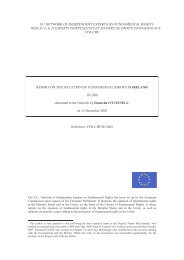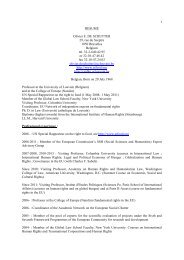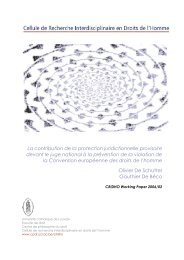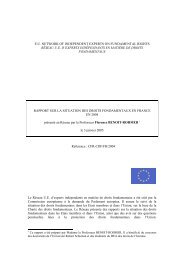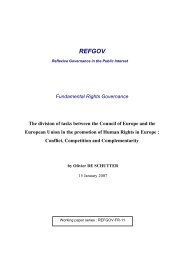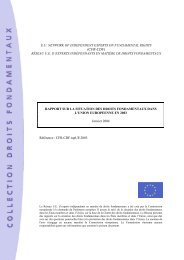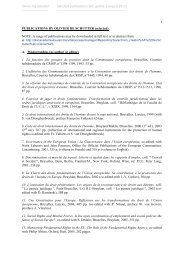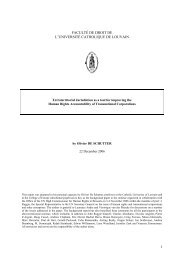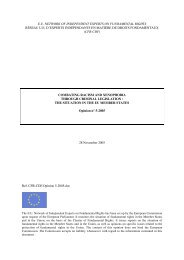The Prohibition of Discrimination under European Human ... - cridho
The Prohibition of Discrimination under European Human ... - cridho
The Prohibition of Discrimination under European Human ... - cridho
Create successful ePaper yourself
Turn your PDF publications into a flip-book with our unique Google optimized e-Paper software.
thematic report<br />
■ THE PROHIBITION OF DISCRIMINATION UNDER EUROPEAN HUMAN RIGHTS LAW ■<br />
1.2. <strong>The</strong> significance <strong>of</strong> the prohibition <strong>of</strong> discrimination and the<br />
question <strong>of</strong> a hierarchy <strong>of</strong> grounds<br />
It is the established case-law <strong>of</strong> the <strong>European</strong> Court <strong>of</strong> <strong>Human</strong> Rights that a difference <strong>of</strong> treatment is<br />
discriminatory within the meaning <strong>of</strong> Article 14 ECHR if it has no objective and reasonable justification, that is if it<br />
does not pursue a legitimate aim or if there is not a reasonable relationship <strong>of</strong> proportionality between the means<br />
employed and the aim sought to be realised. 12 <strong>The</strong> examination <strong>of</strong> a discrimination claim thus requires a twotiered<br />
analysis, focusing first on the aim pursued, second on the relationship between the impugned difference in<br />
treatment (or, as we shall see, the lack there<strong>of</strong>) and the realisation <strong>of</strong> that aim.<br />
How this two-part test is to be applied may depend on the nature <strong>of</strong> the criterion on which the difference in<br />
treatment is based.To this extent, a certain hierarchy <strong>of</strong> grounds does appear in the case-law <strong>of</strong> the <strong>European</strong> Court <strong>of</strong><br />
<strong>Human</strong> Rights : although, in most cases, a difference <strong>of</strong> treatment will pass the test <strong>of</strong> non-discrimination if it pursues a<br />
legitimate aim by means presenting a reasonable relationship <strong>of</strong> proportionality with that aim, where differential<br />
treatment is based on a « suspect » ground, it will be required that it is justified by « very weighty reasons » and that<br />
the difference in treatment appears both suited for realising the legitimate aim pursued, and necessary.<br />
It is difficult to <strong>of</strong>fer a systematic presentation <strong>of</strong> the regime resulting from the hierarchy between « non-suspect » and «<br />
suspect » grounds <strong>of</strong> differentiation, because <strong>of</strong> the shifting character <strong>of</strong> the boundary between the two categories, both<br />
in time and according to the subject-matter <strong>under</strong> consideration. 13 It is however undeniable that certain grounds <strong>of</strong><br />
differentiation require particularly strong justifications from the State. <strong>The</strong>re exists no relationship between the explicit<br />
identification <strong>of</strong> a particular criterion in Article 14 ECHR or Article 1 <strong>of</strong> Protocol n°12 and the question whether or not that<br />
criterion is treated as « suspect » : « property », for instance, although listed in Article 14 ECHR, is a criterion frequently<br />
relied upon by the national authorities in the areas <strong>of</strong> taxation or social security, matters in which States Parties are<br />
recognized as having a wide margin <strong>of</strong> appreciation ; 14 conversely, although not mentioned in Article 14 ECHR, birth out <strong>of</strong><br />
wedlock is considered in principle a suspect ground, 15 requiring any difference in treatment based on such ground to be<br />
justified by « particularly weighty reasons ». Other « suspect » grounds are, inter alia, sex, 16 sexual orientation, 17 and more<br />
12<br />
13<br />
14<br />
15<br />
16<br />
17<br />
See, among many others, the Karlheinz Schmidt v. Germany judgment <strong>of</strong> 18 July 1994, Series A no. 291-B, pp. 32-33, § 24.<br />
Indeed, it has been suggested that a new approach to dealing with protection against discrimination <strong>under</strong> the Convention should be<br />
adopted, based on more clearly delineated variations in the strictness <strong>of</strong> scrutiny : see Oddn_ Mjöll Arnadóttir, Equality and non-discrimination<br />
<strong>under</strong> the <strong>European</strong> Convention on <strong>Human</strong> Rights, Martinus Nijh<strong>of</strong>f Publ., International studies in human rights n° 74,<strong>The</strong> Hague, 2003, 265 pp.;<br />
and J. Gerards,“Intensity <strong>of</strong> Judicial Review in Equal Treatment Cases”, N.I.L.R., 2004, pp. 135-183.<br />
See, e.g., Eur. Ct. HR, Fredin v. Sweden, judgment <strong>of</strong> 18 February 1991, Series A n° 192, § 151; Immobiliare Saffi v. Italy, judgment <strong>of</strong> 28 July 1999,<br />
Reports 1999-V, § 49; or Chapman v. the United Kingdom, judgment <strong>of</strong> 18 January 2001.<br />
Eur. Ct. HR, Inze v. Austria, judgment <strong>of</strong> 28 October 1987, Series A n° 126, § 41; Eur. Ct. HR (3d sect.), Mazurek v. France (Appl. N° 34406/97),<br />
judgment <strong>of</strong> 1 February 2000, § 49 ; Eur. Ct HR (GC), Sommerfeld v. Germany (Appl. N° 31871/96), judgment <strong>of</strong> 8 July 2003, § 93.<br />
See Eur. Ct. HR, Burghartz v. Switzerland, judgment <strong>of</strong> 22 February 1994, Series A no. 280-B, p. 29, § 27; Karlheinz Schmidt v. Germany, judgment <strong>of</strong> 18<br />
July 1994, Series A no. 291-B, pp. 32-33, § 24; Petrovic v. Austria, judgment <strong>of</strong> 27 March 1998, Reports <strong>of</strong> Judgments and Decisions 1998-II, p. 587, § 37)<br />
Indeed, partially for the same motives that an interference with the sexual life <strong>of</strong> a person will only be justified by very serious reasons (see,<br />
e.g., Eur. Ct. HR, Smith and Grady v. the United Kingdom, judgment <strong>of</strong> 27 September 1999 ; Lustig-Prean and Beckett v. the United Kingdom (Appl.<br />
N° 31417/96 and 32377/96), judgment <strong>of</strong> 27 September 1999 ; and Eur. Ct. HR (3d sect.), A.D.T. v. the United Kingdom (Appl. N° 35765/97),<br />
judgment <strong>of</strong> 31 July 2000, ECHR 2000-IX, § 37) – being related to the most intimate aspects <strong>of</strong> one’s personality, such matters should in<br />
principle not concern the outside world –, the Court has considered that differences based on sexual orientation require particularly serious<br />
reasons by way <strong>of</strong> justification : see Eur. Ct. HR (1st section), L. and V. v. Austria (Appl. N° 39392/98 and 39829/98), judgment <strong>of</strong> 9 January 2003, §<br />
45 ; Eur. Ct. HR, S.L. v. Austria (Appl. N° 45330/99), judgment <strong>of</strong> 9 January 2003, § 36 ; Eur. Ct. HR (1st sect.), Karner v. Austria (Appl. N°40016/98),<br />
judgment <strong>of</strong> 24 July 2003, § 37.<br />
14



